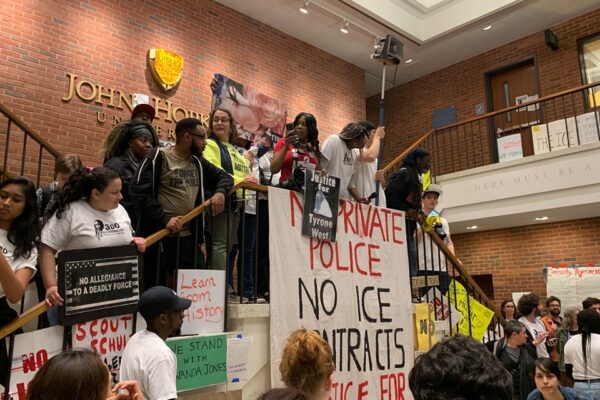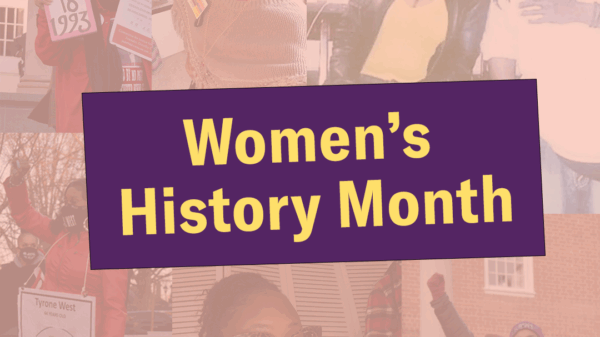“No Justice. No Peace. No Private Police,” was a chant that rang through the Charles Village and Waverly neighborhoods last Wednesday. On the 300th “West Wednesday,” John Hopkins University students and community members gathered together to rally against JHU’s planned private police force and contracts to train employees of the U.S. Immigrations and Customs Enforcement. While dozens of campus security watched ominously from the sidelines, people marched peacefully in the streets and then rallied inside JHU’s administration building.
Early this morning, five JHU student protestors and two community supporters were arrested when the university’s administration called Baltimore Police to clear them out of the building. Thankfully, the State’s Attorney decided that the cases were “abated by arrest,” and the protestors were released.
A prominent figure and voice at the rallies against private police for JHU is Tawanda Jones. During the protest last Wednesday, Jones spoke about the lack of accountability from officers who kill Black people and the pain of losing her big brother, Tyrone West, in a senseless killing carried out by police officers.
“When y’all go to sleep, we can’t sleep. The nightmares are real. Our pain is real,” said Jones.
Every Wednesday, known to community members across Baltimore as “West Wednesday,” Jones has marched against private campus police. Last week marked the 300th “West Wednesday,” signaling nearly 6 years that Tawanda Jones and community members have come together since her brother was killed.
After Tyrone West was killed by Baltimore and Morgan State police officers, a gag order imposed by Baltimore City officials demanded silence from his family members in order to settle their civil case. Jones refused to be gagged about the murder of her brother and would not be forced into silence and seclusion.
While Jones did not sign the gag order, many families in Baltimore, majority Black and experiencing poverty, have little choice but to agree to gag orders as a condition of achieving some measure of justice for their lost loved ones. This requirement can be seen as part of a long history in the U.S. of silencing Black and Brown people, especially Black women, who have been abused at the hands of law enforcement. It is an urgent free speech issue when voices from impacted communities are deliberately silenced.
“It didn’t start with my brother, Tyrone West, and unfortunately, it won’t end with my brother,” said Tawanda Jones. “My brother was pepper sprayed, kicked, tased, and maced; Murdered in broad daylight with witnesses around. The killer cop or the police officer from Morgan sat his 315 pound body on an unarmed man, that was screaming and dying, with his foot on my brother’s neck.”
Students, faculty, and community members at JHU refuse to be silenced. People are demanding to be heard. A reverend from the community, Merrick Moses, spoke at another JHU rally against the private police force. “In the last four years, we know of at least two Black transmen that have been profiled by Hopkins’ campus police,” said Rev. Moses. “What are they going to do when they are armed?”
Because of white supremacy’s strong hold on police departments across America, the creation of a private police force at JHU would put the lives of Black people most at risk. As data has shown, police kill Black people at disproportionately higher rates than white people. The ACLU of Maryland documented statistics in reports in 2015 and 2016, following Freddie Gray’s death at the hands of Baltimore Police officers, and many other police-involved killings across the country. Black Marylanders make up only 30 percent of the population. Yet, nearly 70 percent of people that died in deadly police encounters between 2010-2014 were Black. A follow up report in 2016 found that number actually increased – to 81 percent, and 100 percent of those Black Marylanders who died were unarmed.
The government has a long history of silencing and attempting to silence those who want to hold the government accountable. This history is being extended now – from Baltimore City silencing survivors of police brutality and their families through gag orders, to over-policing of peaceful protests like the 300th “West Wednesday,” to blocking residents from holding their elected officials accountable through democratic processes.
The Women Against Private Police has been advocating against the JHU private police force for months and has resolved to bring the law authorizing the police force, which passed during the 2019 General Assembly, to referendum. But their petition was blocked by the State Board of Elections because the bill included spending measures unrelated to the creation of the JHU police force. WAPP is challenging that decision and has requested review in Anne Arundel County Circuit Court, represented by the ACLU of Maryland and the Public Justice Center.
“If we do not challenge the Board of Elections decision, it sends the message that any bill—and especially a deeply unpopular bill like this one—can be insulated from the threat of veto at the ballot box by simply tacking on an unrelated spending measure,” said Jillian Aldebron, chair of WAPP and a resident of the JHU area. “The State Constitution does give voters the final say when they oppose passage of a bill by their elected representatives, and that is the right to veto it through a referendum. Unless we exercise and defend that right, we risk losing it.”
From the college halls, to the streets, to the courts, the community has spoken strongly against expansion of private police. They need to be heard. It is silence – particularly when people are silenced through the actions of government and influential private interests – that threatens democracy and our rights.


